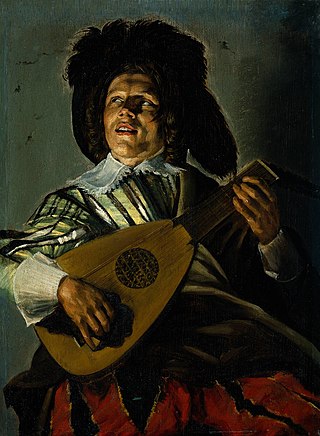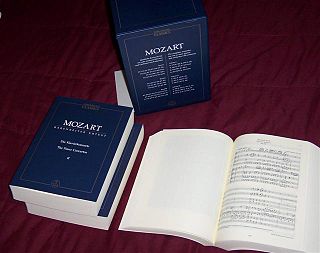Related Research Articles

Sir Edward William Elgar, 1st Baronet, was an English composer, many of whose works have entered the British and international classical concert repertoire. Among his best-known compositions are orchestral works including the Enigma Variations, the Pomp and Circumstance Marches, concertos for violin and cello, and two symphonies. He also composed choral works, including The Dream of Gerontius, chamber music and songs. He was appointed Master of the King's Musick in 1924.

A symphony is an extended musical composition in Western classical music, most often for orchestra. Although the term has had many meanings from its origins in the ancient Greek era, by the late 18th century the word had taken on the meaning common today: a work usually consisting of multiple distinct sections or movements, often four, with the first movement in sonata form. Symphonies are almost always scored for an orchestra consisting of a string section, brass, woodwind, and percussion instruments which altogether number about 30 to 100 musicians. Symphonies are notated in a musical score, which contains all the instrument parts. Orchestral musicians play from parts which contain just the notated music for their own instrument. Some symphonies also contain vocal parts.

Louis-Hector Berlioz was a French Romantic composer and conductor. His output includes orchestral works such as the Symphonie fantastique and Harold in Italy, choral pieces including the Requiem and L'Enfance du Christ, his three operas Benvenuto Cellini, Les Troyens and Béatrice et Bénédict, and works of hybrid genres such as the "dramatic symphony" Roméo et Juliette and the "dramatic legend" La Damnation de Faust.

Edward Elgar composed his Variations on an Original Theme, Op. 36, popularly known as the Enigma Variations, between October 1898 and February 1899. It is an orchestral work comprising fourteen variations on an original theme.

Sir Colin Rex Davis was an English conductor, known for his association with the London Symphony Orchestra, having first conducted it in 1959. His repertoire was broad, but among the composers with whom he was particularly associated were Mozart, Berlioz, Elgar, Sibelius, Stravinsky and Tippett.

Orfeo ed Euridice is an opera composed by Christoph Willibald Gluck, based on the myth of Orpheus and set to a libretto by Ranieri de' Calzabigi. It belongs to the genre of the azione teatrale, meaning an opera on a mythological subject with choruses and dancing. The piece was first performed at the Burgtheater in Vienna on 5 October 1762, in the presence of Empress Maria Theresa. Orfeo ed Euridice is the first of Gluck's "reform" operas, in which he attempted to replace the abstruse plots and overly complex music of opera seria with a "noble simplicity" in both the music and the drama.
Percy Marshall Young was a British music scholar, editor, organist, composer, conductor and teacher.

In music, a serenade is a musical composition or performance delivered in honour of someone or something. Serenades are typically calm, light pieces of music. The term comes from the Italian word serenata, which itself derives from the Latin serenus. Sense influenced by Italian sera "evening", from Latin sera, fem. of serus "late".
Adrian Brown is a British conductor. He is a proponent of contemporary music and has several first performances to his credit.

In the South (Alassio), Op. 50, is a concert overture composed by Edward Elgar during a family holiday in Italy in the winter of 1903 to 1904. He was working on a symphony, but the local atmosphere inspired him instead to write what some have seen as a tone poem, with an Italian flavour. At about 20 minutes' duration it was the composer's longest sustained orchestral piece to that time.
David Adam Cairns is a British journalist, non-fiction writer and musician. He is a leading authority on the life of Berlioz.

The Neue Mozart-Ausgabe is the second complete works edition of the music of Wolfgang Amadeus Mozart. A longer and more formal title for the edition is Wolfgang Amadeus Mozart (1756–1791): Neue Ausgabe sämtlicher Werke [Wolfgang Amadeus Mozart (1756–1791): New Edition of the Complete Works].
Ranieri de' Calzabigi was an Italian poet and librettist, most famous for his collaboration with the composer Christoph Willibald Gluck on his "reform" operas.

Joseph Legros, often also spelt Le Gros, was a French singer and composer of the 18th century. He is best remembered for his association with the composer Christoph Willibald Gluck and is usually regarded as the most prominent haute-contre of his generation, though his acting is reputed to have been mediocre.
Historical editions form part of a category of printed music, which generally consists of classical music and opera from a past repertory, where the term can apply to several different types of published music. However, it is principally applied to one of three types of music of this sort:

Eric Walter Blom was a Swiss-born British-naturalised music lexicographer, music critic and writer. He is best known as the editor of the 5th edition of Grove's Dictionary of Music and Musicians (1954).
Hugh John Macdonald is an English musicologist chiefly known for his work within the music of the 19th century, especially in France. He has been general editor of the Hector Berlioz: New Edition of the Complete Works since its inception in 1967 and has been particularly active in the revival of interest in Berlioz's music. He is also the author of several entries within The Grove Dictionary of Music and Musicians.
Peter John Branscombe was an English academic in German studies, a musicologist, and a writer on Austrian cultural history.

The two main labels that have been used to describe the nationality of Wolfgang Amadeus Mozart are "Austrian" and "German". However, in Mozart's own life, those terms were used differently from the way they are used today, because the modern nation states of Austria and Germany did not yet exist. Any decision to label Mozart as "Austrian" or "German" involves political boundaries, history, language, culture, and Mozart's own views. Editors of modern encyclopedias and other reference sources differ in how they assign a nationality to Mozart in light of conflicting criteria.
Enigma Variations (My Friends Pictured Within) is a one-act ballet by Frederick Ashton, to the music of the Variations on an Original Theme (Enigma Variations), Op. 36, by Edward Elgar. The work was first given by the Royal Ballet at the Royal Opera House, Covent Garden, London, on 25 October 1968. It has been revived in every subsequent decade.
References
- ↑ Auf einen Kaffee mit Mozart, Deutscher Taschenbuch Verlag (2009) ISBN 978-3423345453
- ↑ Professor Julian Rushton, Faculty of Arts, Humanities and Cultures, University of Leeds